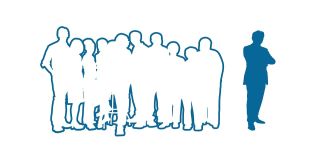
Source: Geralt / Pixabay
Since close relationships are built, almost by definition, as involving bonds between two people, what do you do when you’re with those two people but feel you’re an extraneous third wheel? You could also feel like a fifth wheel when two couples are involved, but in either case, if you seem to be a superfluous member of a couple or group, the experience can be unnerving.
Of course, the situation doesn’t have to devolve quite that much. That other couple or couples could go out of their way to make you feel welcome and included. Yet, it seems they’d be just as happy as if you weren’t there at all.
What the Ostracism Literature Can Teach You
You can feel like an outsider in more situations than just with friendships or other personal relationships. People can and do experience ostracism in the workplace.
A well-established literature in organizational psychology shows how detrimental it can be to morale and productivity when workers feel excluded from their “team.” Perhaps there are lessons to learn about the feelings you’re unneeded or unwanted from this workplace literature.
According to research recently published by Brock University’s Sadia Jahanzeb and colleagues (2023),
Workplace ostracism is specific to the limits of socially acceptable and unacceptable behaviors in the context of the workplace; these behaviors are not typically motivated by a desire to inflict harm and are characterized by the omission, rather than the commission, of an act to engage.
In other words, those who ignore you don’t intend to do so, but it remains, as the authors note, “a dark aspect of workplace interaction.”
The darkness in this unintentional form of interpersonal slighting, the Canadian researchers observe, comes partly from the reactions it produces in ostracized people. They can become prone to retaliation, dishonesty, risky decision-making, procrastination, lower productivity, and the tendency to leave for another position.
Jahanzeb and her fellow authors suggest that these counterproductive behaviors could result from the employee’s inability to self-regulate or control anger and distress. This may sound like a case of blaming the victim.
Still, from the perspective of cognitive theory in psychology, it suggests that people could avoid being dragged into deviant workplace behaviors by taking a rational view of the situation.
The Importance of Psychological Flexibility
Returning to the scenario involving people in your social circle, not those at work, you might reflect on what counterproductive behaviors your feeling of ostracism might lead to in these contexts. Perhaps you refuse to accept invitations where you feel you’ll be that third or fifth wheel.
Maybe you do accept the invitation but ruminate during the entire event about the possibility that they invited you because they felt sorry for you. Like the ostracized employee, you might show up late or, once there, say some things you now regret, such as being overly critical or demanding.
According to the Brock U. researchers, psychological flexibility would instead allow you to “focus on the present, assess the content of the situation, and take appropriate action… despite potentially demanding circumstances or psychological stress.” A realistic view of the group and your position could eliminate feeling unwanted.
The larger viewpoint that Jahanzeb and her team hold is consistent with acceptance-based approaches to psychological health that emphasize taking a clear look at your feelings and reactions but being able to behave in ways consistent with your goals. Once you engage in psychologically flexible thinking, you can better control your counterproductive, self-defeating tendencies.
To test this general model, the Canadian researchers conducted a three-wave survey (each two weeks apart), asking their final sample of 259 employees (average age 51 years old) to rate their feelings of workplace ostracism (e.g., “Others ignored you at work”), procrastination, and organizational deviance (e.g., “Came in late to work without permission”), and to provide basic pieces of demographic information.
The measure of psychological flexibility, which they theorized would play a central role in the relationship between ostracism and negative work outcomes, included items such as “It is OK if I remember something unpleasant” and “My thoughts and feelings do not get in the way of how I want to live my life.”
The statistical test of the research model revealed that, as the authors expected, employees who perceived that they were being ostracized were more likely to procrastinate, which, in turn, predicted organizationally deviant behaviors. However, the relationship was barely there for employees high in psychological flexibility. Only employees with low flexibility turned their sense of being ostracized into counterproductive work behaviors via procrastination.
Defining procrastination as a lack of self-regulation, the authors concluded that those with few psychological resources fall apart when stressed rather than continuing to work toward their goals (i.e., successful employment). Based on the findings, avoiding “impulses and situational contingencies” is the best way to keep your eyes on the prize.
Tapping Into Your Psychological Flexibility
Using the Zahanzeb et al. findings as a model for interpersonal situations outside of work, you can now see how to keep letting the feeling of being extraneous from eating away at your friendships and other important relationships (potentially also including work).
First, the Brock U. findings beg whether feeling ostracized is the same as being ostracized. Perceptions of ostracism served as the starting point for the study’s statistical tests. However, what if a lack of psychological flexibility keeps you from questioning the assumption that you are that extra wheel?
The first step in reducing your feelings of being excluded is to question whether there is a basis in reality for that sense. Try to separate your potential shame or worries about your inability to find a partner to make the gathering end in an even number. Perhaps the people who invite you to be with them like having you around?
Imagining, though, that there are times when you’re being invited to things only out of a sense of obligation, you can also use that resource of psychological flexibility to manage your stress. Yes, you feel a bit abandoned and neglected, but it’s OK to have those feelings, even if they are painful.
Now, think about how you can avoid becoming dragged down by your feelings into self-destructive behaviors. Seeking retaliation by saying unpleasant things or doing what those employees did by showing up late will only create a vicious cycle and further unhappiness for you. Staying positive around those who invite you as the odd number will make you a more desirable companion, so you’ll have fewer occasions to feel (or be) unwanted.
To sum up, positive relationships with others, whether you’re an “extra” or not, depend on being able to look at your thoughts and feelings in a self-accepting and flexible manner. Drawing on your inner resources will help you add a true “plus” to the “plus one” equation.





















+ There are no comments
Add yours